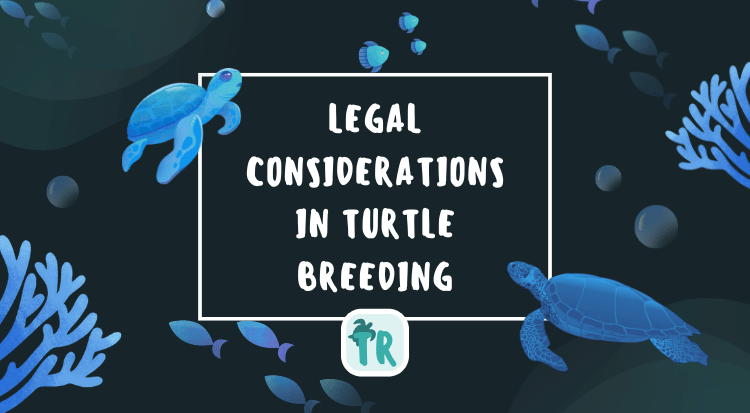Legal Considerations in Turtle Breeding
Understand the legal considerations in turtle breeding, including permits, protected species, selling regulations, and ethical practices to ensure compliance.

Breeding turtles is not just a hobby, it's an exciting and rewarding experience. However, it's important to understand the legal considerations involved. Laws and regulations are in place to protect turtles and ensure ethical breeding practices.
This guide will help you navigate the legal aspects of turtle breeding, including permits, species protection, selling regulations, and responsible practices. By staying informed and compliant, you can enjoy breeding turtles while contributing positively to their conservation.
Understanding Laws and Regulations
Different regions have specific laws governing turtle breeding.
Federal and National Laws
- Endangered Species Protection: Many countries have laws to protect endangered turtles.
- Prohibited Activities: It's illegal to harm, capture, or sell endangered species without proper authorization.
- Permits: Special permits may be required to breed certain species.
- Trade Regulations: International agreements like CITES regulate the trade of turtles.
- CITES: The Convention on International Trade in Endangered Species controls cross-border trade to prevent exploitation.
- Import/Export: Permits are needed to move turtles between countries.
State and Local Laws
- Varied Regulations: Laws can differ between states or regions.
- Protected Species: Some turtles are protected locally, even if not nationally endangered.
- Breeding Licenses: You might need a license to breed or sell turtles in your area.
- Size Restrictions: Regulations may limit the sale of turtles below a certain size.
Health and Safety Laws
- Disease Prevention: Laws aim to prevent the spread of illnesses like salmonella.
- Sale Restrictions: Some regions prohibit selling small and young turtles to reduce health risks.
- Information Requirements: Sellers may need to provide health and safety information to buyers.
Obtaining Necessary Permits
Before starting a breeding program, ensure you have all required permits.
Breeding Permits
- Application Process:
- Contact Authorities: Reach out to wildlife agencies for guidance.
- Provide Documentation: You may need to show plans for proper care and housing.
- Compliance:
- Renewals: Permits might need to be renewed periodically.
- Inspections: Be prepared for possible habitat inspections.
Selling Permits
- Business Licensing:
- Retail License: Required if you plan to sell turtles.
- Record Keeping:
- Sales Records: Maintain records of all transactions.
- Buyer Information: Some laws require documenting buyer details.
Protecting Endangered Species
Certain turtle species are endangered and have strict protections.
Identifying Protected Species
- Research: Know which species are protected by law.
- Legal Restrictions:
- No Breeding or Selling: It's illegal to breed or sell protected species without authorization.
Conservation Programs
- Collaboration:
- Working with Authorities: Participate in approved conservation breeding programs.
- Contributing to Recovery: Help increase populations of endangered turtles responsibly.
Ethical Breeding Practices
Remember, ethical considerations are as important as legal ones in turtle breeding. It's not just about following the rules, it's about caring for these creatures and ensuring their well-being.
Avoiding Inbreeding
- Genetic Diversity:
- Healthy Offspring: Prevent genetic problems by not breeding closely related turtles.
- Record Keeping: Track the lineage of your turtles.
Animal Welfare
- Proper Care:
- Habitat Standards: Provide clean, spacious, and suitable environments.
- Health Monitoring: Regular veterinary check-ups are essential.
Responsible Selling
- Educating Buyers:
- Care Information: Educate and guide buyers on proper turtle care.
- Legal Obligations: Inform buyers about any laws that apply to owning turtles.
Restrictions on Selling Turtles
Be aware of regulations that affect selling turtles.
Size Restrictions
- Minimum Size Laws:
- Health Concerns: In some places, selling turtles under 4 inches (10 cm) in shell length is illegal to prevent disease spread.
Online Sales
- Shipping Regulations:
- Carrier Policies: Check with shipping companies about their rules for live animals.
- Safe Packaging: Ensure turtles are shipped humanely and securely.
International Sales
- Trade Compliance:
- Export/Import Permits: Required for international transactions.
- Customs Declarations: Accurately declare turtles when crossing borders.
Consequences of Legal Violations
It's crucial to understand that ignoring laws can lead to serious penalties. Breeding turtles is a responsibility, and it's important to be aware of the potential consequences of legal violations.
Fines and Penalties
- Financial Consequences: Violations can result in heavy fines.
- Legal Action: Serious cases might lead to criminal charges.
Seizure of Turtles
- Confiscation: Authorities may remove turtles from your care if laws are broken.
- Impact on Breeding: Legal issues can halt your breeding activities.
Staying Informed and Compliant
Regularly updating your knowledge helps you stay within the law.
Research Regularly
- Stay Updated: Laws can change; keep informed about current regulations.
- Official Sources: Refer to government websites and official publications.
Consult Professionals
- Legal Advice: Speak with attorneys who specialize in wildlife laws.
- Wildlife Agencies: Contact local agencies for guidance.
Join Breeder Communities
- Networking: Connect with other breeders to share information.
- Educational Opportunities: Attend workshops and seminars on turtle breeding and conservation.
Conclusion
Breeding turtles involves important legal responsibilities. By understanding and following laws and regulations, you ensure the well-being of your turtles and contribute to their conservation. Always obtain necessary permits, practice ethical breeding, and stay informed about legal changes.
Responsible breeding not only keeps you compliant but also supports the health and survival of turtle populations. Remember, staying informed and compliant is not just a legal obligation but a moral one ensuring these fascinating creatures' well-being.
